高考常用词汇辨析2
图片预览

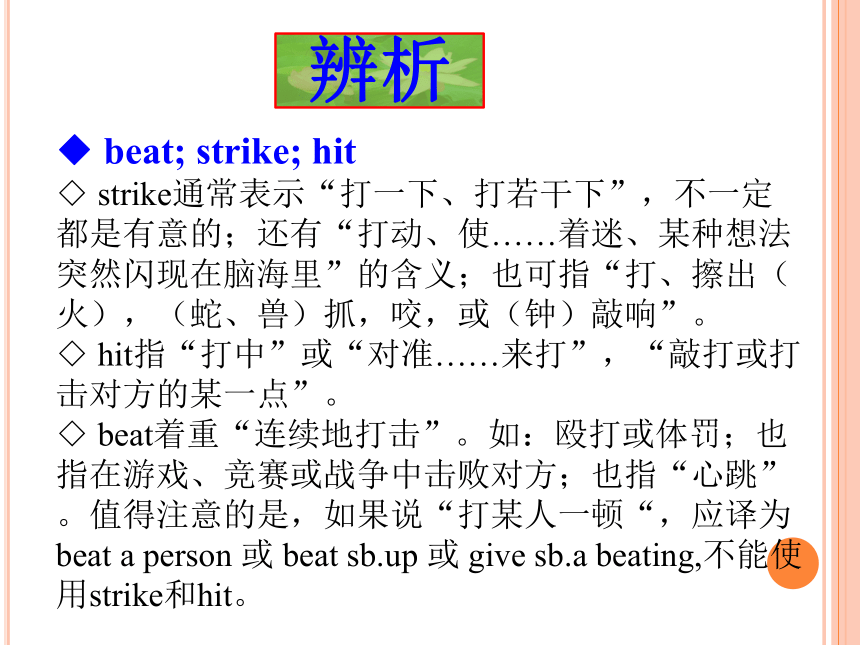
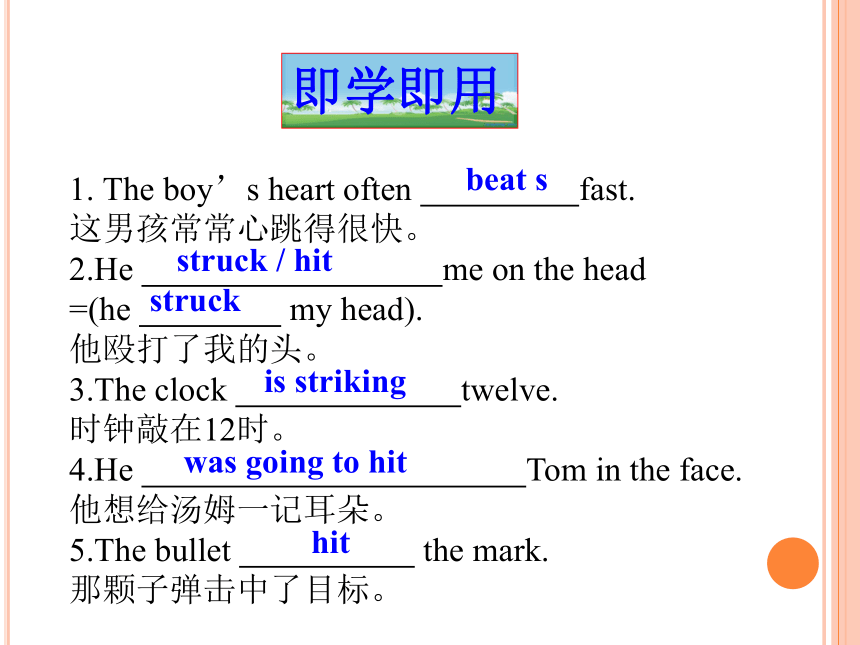
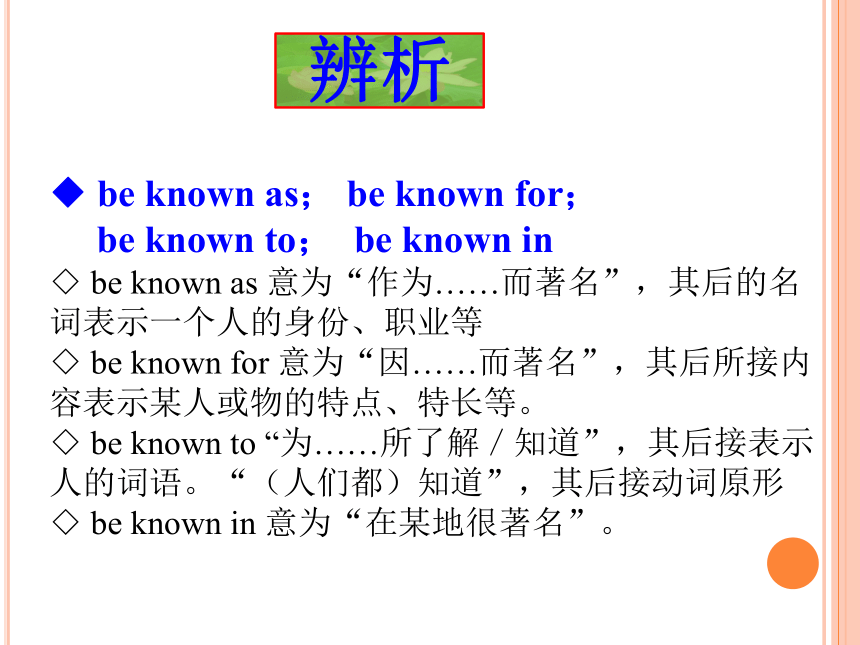
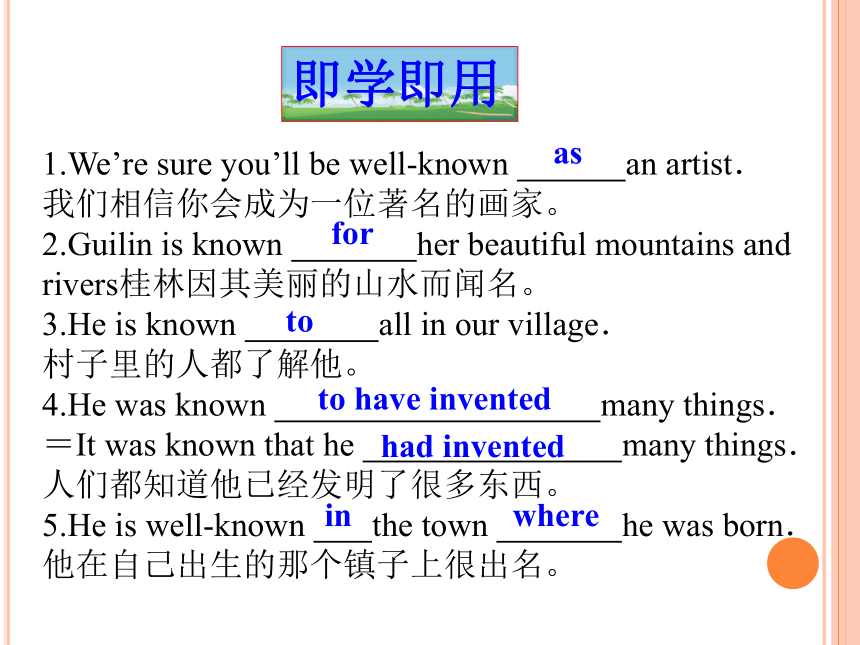
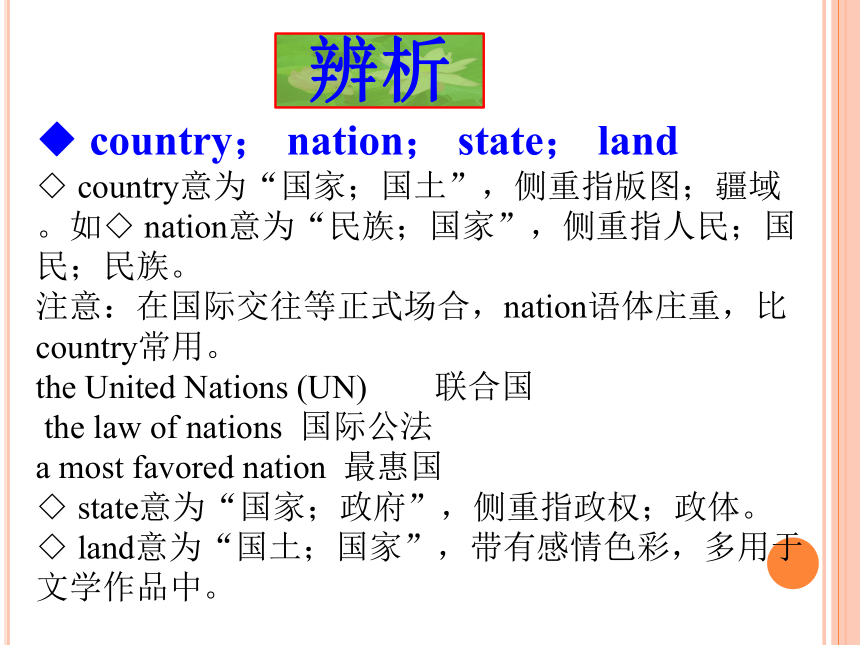
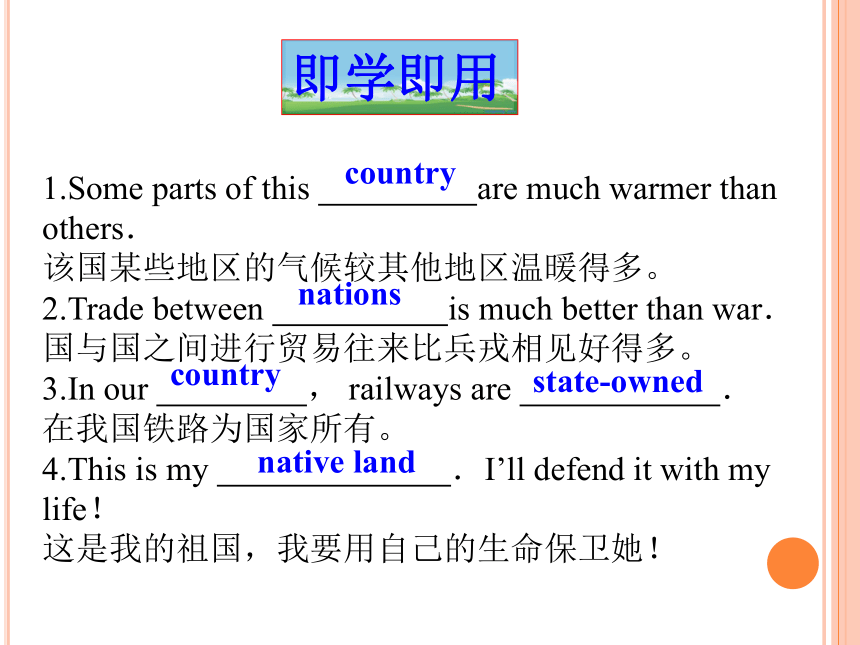
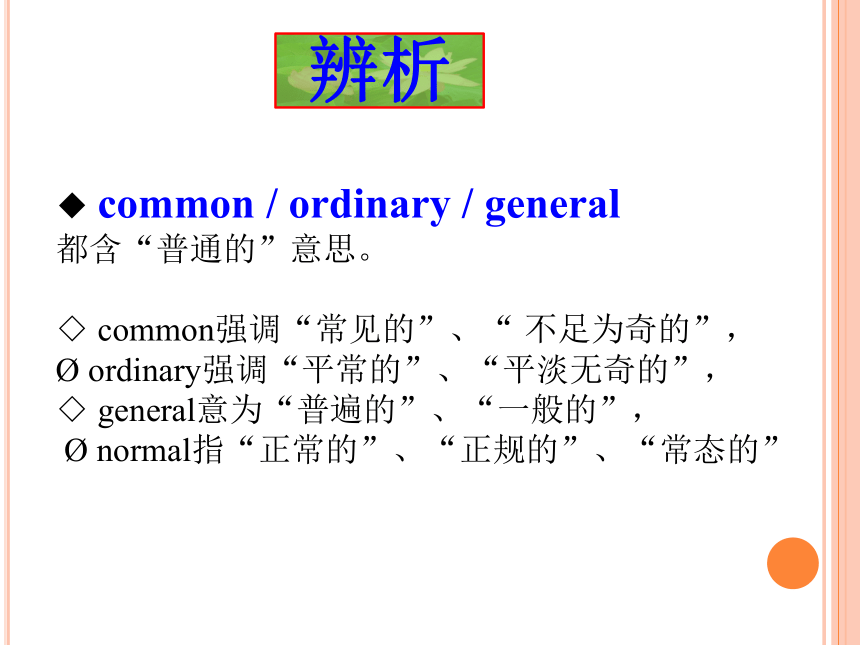
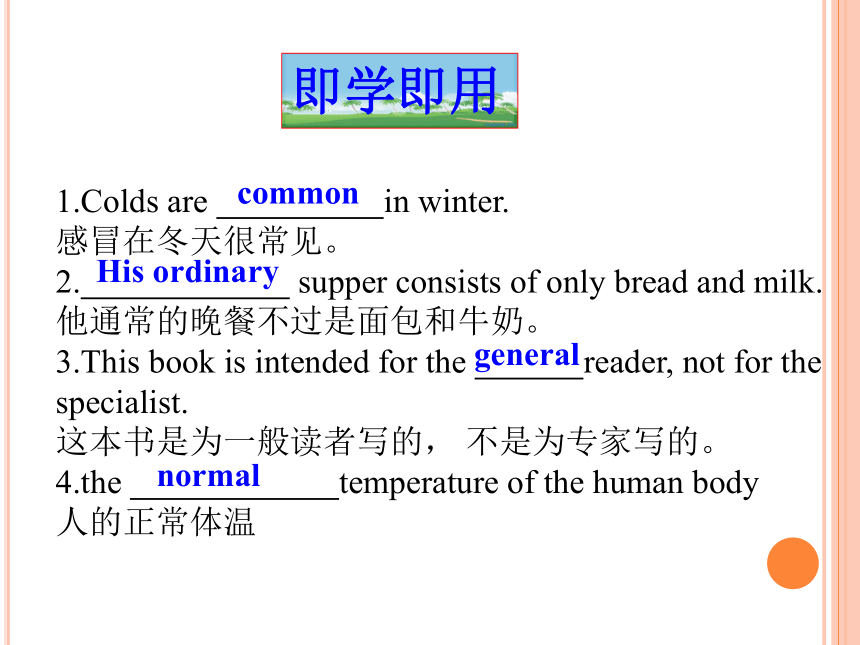
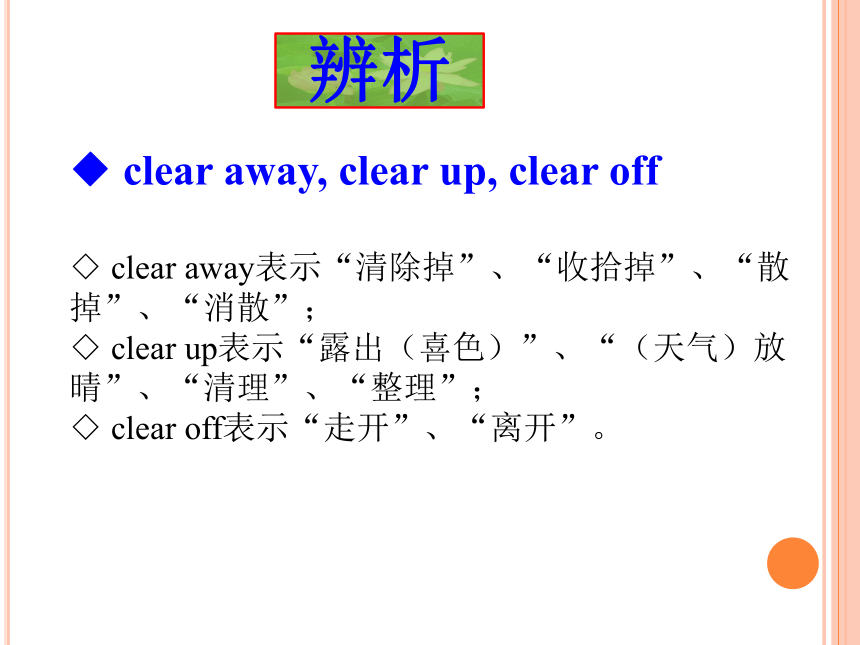
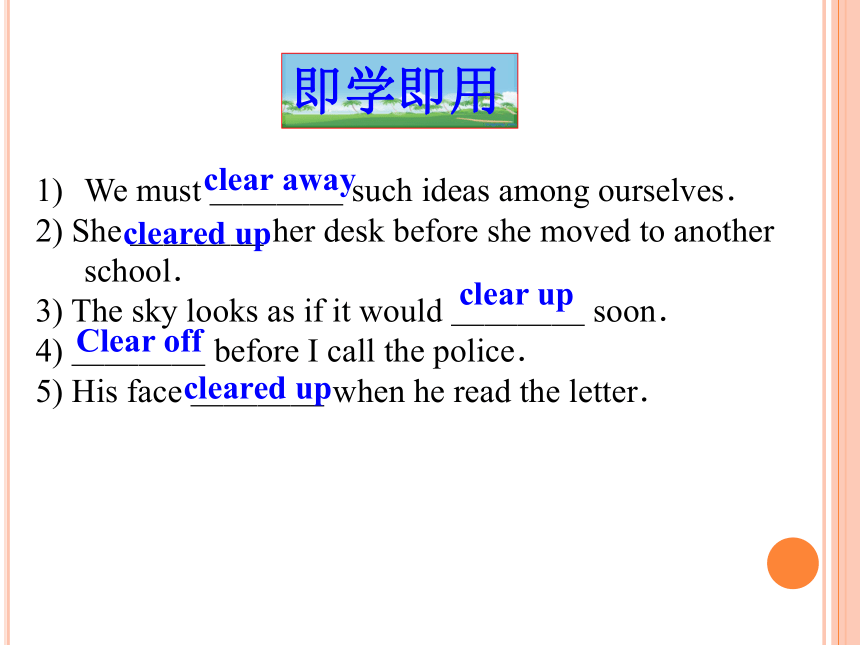
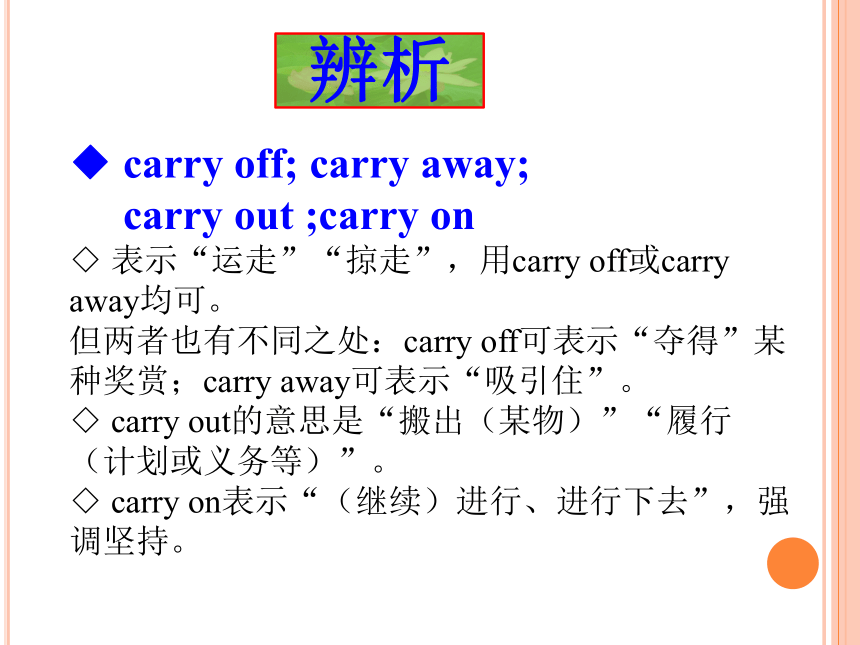
文档简介
(共30张PPT)
高考常用词语辨析
辨析
◆ beat; strike; hit
◇ strike通常表示“打一下、打若干下”,不一定都是有意的;还有“打动、使……着迷、某种想法突然闪现在脑海里”的含义;也可指“打、擦出(火),(蛇、兽)抓,咬,或(钟)敲响”。
◇ hit指“打中”或“对准……来打”,“敲打或打击对方的某一点”。
◇ beat着重“连续地打击”。如:殴打或体罚;也指在游戏、竞赛或战争中击败对方;也指“心跳”。值得注意的是,如果说“打某人一顿“,应译为beat a person 或 beat sb.up 或 give sb.a beating,不能使用strike和hit。
即学即用
1. The boy’s heart often fast.
这男孩常常心跳得很快。 2.He me on the head
=(he my head).
他殴打了我的头。 3.The clock twelve.
时钟敲在12时。 4.He Tom in the face.
他想给汤姆一记耳朵。 5.The bullet the mark.
那颗子弹击中了目标。
beat s
struck / hit
struck
is striking
was going to hit
hit
辨析
◆ be known as; be known for;
be known to; be known in
◇ be known as 意为“作为……而著名”,其后的名词表示一个人的身份、职业等
◇ be known for 意为“因……而著名”,其后所接内容表示某人或物的特点、特长等。
◇ be known to “为……所了解/知道”,其后接表示人的词语。“(人们都)知道”,其后接动词原形
◇ be known in 意为“在某地很著名”。
1.We’re sure you’ll be well-known an artist.
我们相信你会成为一位著名的画家。
2.Guilin is known her beautiful mountains and rivers桂林因其美丽的山水而闻名。
3.He is known all in our village.
村子里的人都了解他。
4.He was known many things.
=It was known that he many things.
人们都知道他已经发明了很多东西。
5.He is well-known the town he was born.
他在自己出生的那个镇子上很出名。
即学即用
as
for
to
to have invented
had invented
in
where
辨析
◆ country; nation; state; land
◇ country意为“国家;国土”,侧重指版图;疆域。如◇ nation意为“民族;国家”,侧重指人民;国民;民族。
注意:在国际交往等正式场合,nation语体庄重,比country常用。
the United Nations (UN) 联合国
the law of nations 国际公法
a most favored nation 最惠国
◇ state意为“国家;政府”,侧重指政权;政体。
◇ land意为“国土;国家”,带有感彩,多用于文学作品中。
即学即用
1.Some parts of this are much warmer than others.
该国某些地区的气候较其他地区温暖得多。
2.Trade between is much better than war.
国与国之间进行贸易往来比兵戎相见好得多。
3.In our , railways are .
在我国铁路为国家所有。
4.This is my .I’ll defend it with my life!
这是我的祖国,我要用自己的生命保卫她!
country
nations
country
state-owned
native land
辨析
◆ common / ordinary / general
都含“普通的”意思。
◇ common强调“常见的”、“ 不足为奇的”,
ordinary强调“平常的”、“平淡无奇的”,
◇ general意为“普遍的”、“一般的”,
normal指“正常的”、“正规的”、“常态的”
即学即用
1.Colds are in winter.
感冒在冬天很常见。
2. supper consists of only bread and milk.
他通常的晚餐不过是面包和牛奶。
3.This book is intended for the reader, not for the specialist.
这本书是为一般读者写的, 不是为专家写的。
4.the temperature of the human body
人的正常体温
common
His ordinary
general
normal
辨析
◆ clear away, clear up, clear off
◇ clear away表示“清除掉”、“收拾掉”、“散掉”、“消散”;
◇ clear up表示“露出(喜色)”、“(天气)放晴”、“清理”、“整理”;
◇ clear off表示“走开”、“离开”。
即学即用
We must ____ such ideas among ourselves.
2) She ____ her desk before she moved to another school.
3) The sky looks as if it would ____ soon.
4) ____ before I call the police.
5) His face ____ when he read the letter.
clear away
cleared up
clear up
Clear off
cleared up
辨析
◆ carry off; carry away;
carry out ;carry on
◇ 表示“运走”“掠走”,用carry off或carry away均可。
但两者也有不同之处:carry off可表示“夺得”某种奖赏;carry away可表示“吸引住”。
◇ carry out的意思是“搬出(某物)”“履行(计划或义务等)”。
◇ carry on表示“(继续)进行、进行下去”,强调坚持。
即学即用
1.I the first prize.
我获得了头等奖。
2.We by her songs.
她的歌声令我们浑然忘我。
3.Would you please the desk into the garden﹖
请你把桌子搬到花园里去好吗?
4.Comrades in Germany a heroic fight against war under conditions of fascism at that time.
那时,在德国的同志正在法西斯的统治区进行一场英勇的反战斗争。
carried off
were carried away
carry out
were carrying on
辨析
◆ cause; reason; excuse
◇ cause意为“起因”、“原因”,指引起某种结果的必然原因,即主要事实方面的原因,常和effect连用,表示因果关系。
◇ reason意为“理由”、“原因”,指用以解释某些已发生的事情的理由或借口,这种理由可能是也可能不是真正的理由,强调逻辑推理方面的理由。
◇ excuse指为免受指责和推卸责任而找的“理由”、“原因”?也就是我们常说的“借口”。
即学即用
1.The of the fire was carelessness.
失火的原因是粗心大意。
2.Tell us for changing the plan.
告诉我们你改变计划的原因。
3.Too much work is for absence.
工作太忙不能成为缺席的理由。
4.I haven’t done the work well, is that I have been ill.
我没把工作做好,我的理由是我病了。
cause
your reason
no excuse
my excuse
◆ damp wet dank moist humid
都含"潮湿的"意思。
◇ damp指"轻度潮湿, 使人感觉不舒服的",
◇ wet 指"含水分或其他液体的"、"湿的",
◇ dank 指"阴湿的",
◇ moist指"微湿的"、"湿润的", 常含"不十分干, 此湿度是令人愉快的"意思,
◇ humid为正式用语, 常表示"空气中湿度大的",
辨析
1.I don't like weather.
我不喜欢潮湿的天气。
2.be to the skin
浑身湿透。
3.a dark and chilly cave
一个既黑暗又潮湿、又阴冷的洞。
4.Grasses were with dew.
草被露水润湿了。
5.In the east, the air is in summer.
在东方, 夏季空气潮湿。
即学即用
damp
wet
dank
moist
humid
辨析
◆ damage; destroy; ruin
◇ damage意为“损坏、破坏”。它可用于表示损坏或破坏具体的物品,一般暗示损坏后价值或效益会降低,这种损坏是部分性的,通常指损坏的程度不那么严重,还可以修复再用。也可用于表示损坏抽象的东西,有时该词也用于借喻。
◇ damage还可用作可数或不可数名词。
◇ destroy意为“破坏;摧毁;消灭;毁灭”,通常指程度非常严重的“毁坏”,一般情况下不可以修复再用。另外,它既可表示毁坏具体的物品,也可表示毁坏抽象的东西。◇ ruin多用于借喻之中,有时泛指一般性的破坏,指把某物损坏到了不能再使用的程度。
即学即用
1.The car in the accident, but five people were seriously hurt.
汽车在事故中损坏不严重,但却有五个人受了重伤。
2.What they said and did the relations between the two countries.
他们的言行损害了这两个国家之间的关系。
3.The earthquake did to the city.
这场地震给这座城市带来了巨大的破坏。
damaged
a lot of damages
was not damaged badly
4.The big fire the whole house.
这场大火把整座房子都烧毁了。
5.I by that law case; I'm a man?我被那场官司毁了,我破产了。
即学即用
destroyed
was ruined
ruined
辨析
◆ ever before;ever since;ever after
◇ ever since意为“从……之后一直”,其中的since既可作副词,也可作连词,该短语与完成时连用。有时ever可以省略。
◇ ever before意为“比以往任何时候”,其中的before为副词,常与比较级连用并放在than之后。ever用来加强before的语气,before有时可以省略。
◇ ever after意为“从那以后”,其中的after可作连词,也可作副词,该短语常与过去时连用。
即学即用
1.He went to Tibet in 1969
and has lived there ____.
2.The flowers grow more beautiful than ____.
3.The couple lived a hard life ____.
ever since
ever before
ever after
辨析
◆ for example;such as;like
◇ such as用来举例说明,通常放在被列举的事物的前面以及需要说明的事物的后面。
◇ for example常用来补充说明,表示在众多的例子中仅仅取一、二加以说明、解释。
◇ like是介词,意为“像”。
即学即用
1.Many books on English study,____ School English are popular among school students.
2.Some students,Wang Lin,____ like country music very much.
3.I’m going to be a pop star ____ Michael Jackson.
such as
for example
like
辨析
◆ finally;at last;in the end
本组词语均有“终于”之意,但有区别。
◇ finally的用法有二:1. 用来表示某一动作发生的顺序是在“最后”。2.是用在句中动词前,表示等了好久“终于……”。
◇ at last是表示经过一番曲折或努力之后某事才发生,强调其结果,其语气和感彩较强。
◇ in the end用法有二:*表示经过若干周折或努力而“最后”发生了某事。。 *表示预测未来(而finally和at last无此用法)。
即学即用
1.We waited and waited,and they arrived.
我们等了又等,(最后)他们终于来了。
2. the project has been completed and we can rest.
这项工程终于竣工了,我们可以休息了。
3.We did experiment after experiment,and we got a good harvest of rice in Africa.
我们作了一个又一个实验,(最后)终于在非洲获得了水稻丰收
4.He hopes that his son will be a fine teacher .
他希望他儿子最终成为一名优秀教师。
finally
At last
in the end
in the end
辨析
◆ festival,holiday,vacation ,leave
◇ festival指盛大的节日,或定期在某地举行的主题节日;如音乐节等。
◇ holiday源自“holy”,原意为“神圣的日子”,或指国家或民族规定的节日。后词意扩展,指一切不工作的日子。
◇ vacation任何节假日或休息日,持续时间较长,主要用于美国。在英国,则着重指法院和大学的假期。 ◇ leave 指“请假”,被批准后离开自己的工作的一段时间
即学即用
1.The Spring ___ is the most important day in China.
2.Will you spend your ___abroad this year?
3.While I’m away on ___,Mr Smith will take over my job.
4.He asked for .
他请了6个月的假。
Festival
holidays/vacation
vacation
a six months' leave
◆ fall off;fall down;fall onto;fall into
◇ fall off用作及物动词,表示“从……上落下,掉下,摔下”。有时,它也可用作不及物动词,表示“落下,掉下,脱落”;也可表示“减少,越来越少”。
◇ fall down通常用作不及物动词,表示“(人)跌倒,摔倒,绊倒”或“(房屋等) 倒塌”。
◇ fall onto意为“掉到……上”,其中onto为介词,也可用to。
◇ fall into意为“掉到……里陷入(困难)”等,into是介词。
辨析
1.The house moved and a few pictures the wall,but that was all.
房子动了动,几幅画从墙上掉了下来,就这些。
2.His supporters .
支持他的人越来越少了。
3.The old lady in the street and broke her leg.那老太太在街上跌倒了,摔坏了腿。
4.The books the desk the ground.
书从桌上掉到了地上。
5.The old woman the river carelessly.
这个老妇人不小心掉进河里
即学即用
fell off
were falling off
fell down
fell off
onto/to
fell into
高考常用词语辨析
辨析
◆ beat; strike; hit
◇ strike通常表示“打一下、打若干下”,不一定都是有意的;还有“打动、使……着迷、某种想法突然闪现在脑海里”的含义;也可指“打、擦出(火),(蛇、兽)抓,咬,或(钟)敲响”。
◇ hit指“打中”或“对准……来打”,“敲打或打击对方的某一点”。
◇ beat着重“连续地打击”。如:殴打或体罚;也指在游戏、竞赛或战争中击败对方;也指“心跳”。值得注意的是,如果说“打某人一顿“,应译为beat a person 或 beat sb.up 或 give sb.a beating,不能使用strike和hit。
即学即用
1. The boy’s heart often fast.
这男孩常常心跳得很快。 2.He me on the head
=(he my head).
他殴打了我的头。 3.The clock twelve.
时钟敲在12时。 4.He Tom in the face.
他想给汤姆一记耳朵。 5.The bullet the mark.
那颗子弹击中了目标。
beat s
struck / hit
struck
is striking
was going to hit
hit
辨析
◆ be known as; be known for;
be known to; be known in
◇ be known as 意为“作为……而著名”,其后的名词表示一个人的身份、职业等
◇ be known for 意为“因……而著名”,其后所接内容表示某人或物的特点、特长等。
◇ be known to “为……所了解/知道”,其后接表示人的词语。“(人们都)知道”,其后接动词原形
◇ be known in 意为“在某地很著名”。
1.We’re sure you’ll be well-known an artist.
我们相信你会成为一位著名的画家。
2.Guilin is known her beautiful mountains and rivers桂林因其美丽的山水而闻名。
3.He is known all in our village.
村子里的人都了解他。
4.He was known many things.
=It was known that he many things.
人们都知道他已经发明了很多东西。
5.He is well-known the town he was born.
他在自己出生的那个镇子上很出名。
即学即用
as
for
to
to have invented
had invented
in
where
辨析
◆ country; nation; state; land
◇ country意为“国家;国土”,侧重指版图;疆域。如◇ nation意为“民族;国家”,侧重指人民;国民;民族。
注意:在国际交往等正式场合,nation语体庄重,比country常用。
the United Nations (UN) 联合国
the law of nations 国际公法
a most favored nation 最惠国
◇ state意为“国家;政府”,侧重指政权;政体。
◇ land意为“国土;国家”,带有感彩,多用于文学作品中。
即学即用
1.Some parts of this are much warmer than others.
该国某些地区的气候较其他地区温暖得多。
2.Trade between is much better than war.
国与国之间进行贸易往来比兵戎相见好得多。
3.In our , railways are .
在我国铁路为国家所有。
4.This is my .I’ll defend it with my life!
这是我的祖国,我要用自己的生命保卫她!
country
nations
country
state-owned
native land
辨析
◆ common / ordinary / general
都含“普通的”意思。
◇ common强调“常见的”、“ 不足为奇的”,
ordinary强调“平常的”、“平淡无奇的”,
◇ general意为“普遍的”、“一般的”,
normal指“正常的”、“正规的”、“常态的”
即学即用
1.Colds are in winter.
感冒在冬天很常见。
2. supper consists of only bread and milk.
他通常的晚餐不过是面包和牛奶。
3.This book is intended for the reader, not for the specialist.
这本书是为一般读者写的, 不是为专家写的。
4.the temperature of the human body
人的正常体温
common
His ordinary
general
normal
辨析
◆ clear away, clear up, clear off
◇ clear away表示“清除掉”、“收拾掉”、“散掉”、“消散”;
◇ clear up表示“露出(喜色)”、“(天气)放晴”、“清理”、“整理”;
◇ clear off表示“走开”、“离开”。
即学即用
We must ____ such ideas among ourselves.
2) She ____ her desk before she moved to another school.
3) The sky looks as if it would ____ soon.
4) ____ before I call the police.
5) His face ____ when he read the letter.
clear away
cleared up
clear up
Clear off
cleared up
辨析
◆ carry off; carry away;
carry out ;carry on
◇ 表示“运走”“掠走”,用carry off或carry away均可。
但两者也有不同之处:carry off可表示“夺得”某种奖赏;carry away可表示“吸引住”。
◇ carry out的意思是“搬出(某物)”“履行(计划或义务等)”。
◇ carry on表示“(继续)进行、进行下去”,强调坚持。
即学即用
1.I the first prize.
我获得了头等奖。
2.We by her songs.
她的歌声令我们浑然忘我。
3.Would you please the desk into the garden﹖
请你把桌子搬到花园里去好吗?
4.Comrades in Germany a heroic fight against war under conditions of fascism at that time.
那时,在德国的同志正在法西斯的统治区进行一场英勇的反战斗争。
carried off
were carried away
carry out
were carrying on
辨析
◆ cause; reason; excuse
◇ cause意为“起因”、“原因”,指引起某种结果的必然原因,即主要事实方面的原因,常和effect连用,表示因果关系。
◇ reason意为“理由”、“原因”,指用以解释某些已发生的事情的理由或借口,这种理由可能是也可能不是真正的理由,强调逻辑推理方面的理由。
◇ excuse指为免受指责和推卸责任而找的“理由”、“原因”?也就是我们常说的“借口”。
即学即用
1.The of the fire was carelessness.
失火的原因是粗心大意。
2.Tell us for changing the plan.
告诉我们你改变计划的原因。
3.Too much work is for absence.
工作太忙不能成为缺席的理由。
4.I haven’t done the work well, is that I have been ill.
我没把工作做好,我的理由是我病了。
cause
your reason
no excuse
my excuse
◆ damp wet dank moist humid
都含"潮湿的"意思。
◇ damp指"轻度潮湿, 使人感觉不舒服的",
◇ wet 指"含水分或其他液体的"、"湿的",
◇ dank 指"阴湿的",
◇ moist指"微湿的"、"湿润的", 常含"不十分干, 此湿度是令人愉快的"意思,
◇ humid为正式用语, 常表示"空气中湿度大的",
辨析
1.I don't like weather.
我不喜欢潮湿的天气。
2.be to the skin
浑身湿透。
3.a dark and chilly cave
一个既黑暗又潮湿、又阴冷的洞。
4.Grasses were with dew.
草被露水润湿了。
5.In the east, the air is in summer.
在东方, 夏季空气潮湿。
即学即用
damp
wet
dank
moist
humid
辨析
◆ damage; destroy; ruin
◇ damage意为“损坏、破坏”。它可用于表示损坏或破坏具体的物品,一般暗示损坏后价值或效益会降低,这种损坏是部分性的,通常指损坏的程度不那么严重,还可以修复再用。也可用于表示损坏抽象的东西,有时该词也用于借喻。
◇ damage还可用作可数或不可数名词。
◇ destroy意为“破坏;摧毁;消灭;毁灭”,通常指程度非常严重的“毁坏”,一般情况下不可以修复再用。另外,它既可表示毁坏具体的物品,也可表示毁坏抽象的东西。◇ ruin多用于借喻之中,有时泛指一般性的破坏,指把某物损坏到了不能再使用的程度。
即学即用
1.The car in the accident, but five people were seriously hurt.
汽车在事故中损坏不严重,但却有五个人受了重伤。
2.What they said and did the relations between the two countries.
他们的言行损害了这两个国家之间的关系。
3.The earthquake did to the city.
这场地震给这座城市带来了巨大的破坏。
damaged
a lot of damages
was not damaged badly
4.The big fire the whole house.
这场大火把整座房子都烧毁了。
5.I by that law case; I'm a man?我被那场官司毁了,我破产了。
即学即用
destroyed
was ruined
ruined
辨析
◆ ever before;ever since;ever after
◇ ever since意为“从……之后一直”,其中的since既可作副词,也可作连词,该短语与完成时连用。有时ever可以省略。
◇ ever before意为“比以往任何时候”,其中的before为副词,常与比较级连用并放在than之后。ever用来加强before的语气,before有时可以省略。
◇ ever after意为“从那以后”,其中的after可作连词,也可作副词,该短语常与过去时连用。
即学即用
1.He went to Tibet in 1969
and has lived there ____.
2.The flowers grow more beautiful than ____.
3.The couple lived a hard life ____.
ever since
ever before
ever after
辨析
◆ for example;such as;like
◇ such as用来举例说明,通常放在被列举的事物的前面以及需要说明的事物的后面。
◇ for example常用来补充说明,表示在众多的例子中仅仅取一、二加以说明、解释。
◇ like是介词,意为“像”。
即学即用
1.Many books on English study,____ School English are popular among school students.
2.Some students,Wang Lin,____ like country music very much.
3.I’m going to be a pop star ____ Michael Jackson.
such as
for example
like
辨析
◆ finally;at last;in the end
本组词语均有“终于”之意,但有区别。
◇ finally的用法有二:1. 用来表示某一动作发生的顺序是在“最后”。2.是用在句中动词前,表示等了好久“终于……”。
◇ at last是表示经过一番曲折或努力之后某事才发生,强调其结果,其语气和感彩较强。
◇ in the end用法有二:*表示经过若干周折或努力而“最后”发生了某事。。 *表示预测未来(而finally和at last无此用法)。
即学即用
1.We waited and waited,and they arrived.
我们等了又等,(最后)他们终于来了。
2. the project has been completed and we can rest.
这项工程终于竣工了,我们可以休息了。
3.We did experiment after experiment,and we got a good harvest of rice in Africa.
我们作了一个又一个实验,(最后)终于在非洲获得了水稻丰收
4.He hopes that his son will be a fine teacher .
他希望他儿子最终成为一名优秀教师。
finally
At last
in the end
in the end
辨析
◆ festival,holiday,vacation ,leave
◇ festival指盛大的节日,或定期在某地举行的主题节日;如音乐节等。
◇ holiday源自“holy”,原意为“神圣的日子”,或指国家或民族规定的节日。后词意扩展,指一切不工作的日子。
◇ vacation任何节假日或休息日,持续时间较长,主要用于美国。在英国,则着重指法院和大学的假期。 ◇ leave 指“请假”,被批准后离开自己的工作的一段时间
即学即用
1.The Spring ___ is the most important day in China.
2.Will you spend your ___abroad this year?
3.While I’m away on ___,Mr Smith will take over my job.
4.He asked for .
他请了6个月的假。
Festival
holidays/vacation
vacation
a six months' leave
◆ fall off;fall down;fall onto;fall into
◇ fall off用作及物动词,表示“从……上落下,掉下,摔下”。有时,它也可用作不及物动词,表示“落下,掉下,脱落”;也可表示“减少,越来越少”。
◇ fall down通常用作不及物动词,表示“(人)跌倒,摔倒,绊倒”或“(房屋等) 倒塌”。
◇ fall onto意为“掉到……上”,其中onto为介词,也可用to。
◇ fall into意为“掉到……里陷入(困难)”等,into是介词。
辨析
1.The house moved and a few pictures the wall,but that was all.
房子动了动,几幅画从墙上掉了下来,就这些。
2.His supporters .
支持他的人越来越少了。
3.The old lady in the street and broke her leg.那老太太在街上跌倒了,摔坏了腿。
4.The books the desk the ground.
书从桌上掉到了地上。
5.The old woman the river carelessly.
这个老妇人不小心掉进河里
即学即用
fell off
were falling off
fell down
fell off
onto/to
fell into
